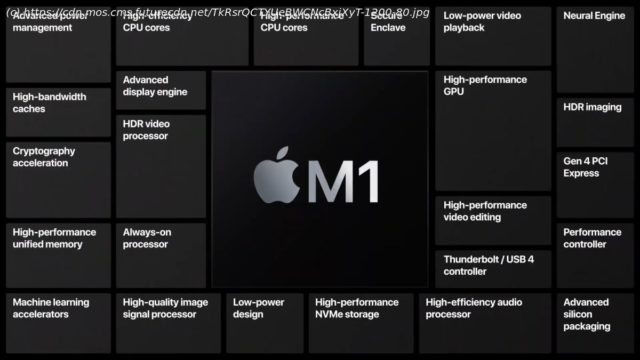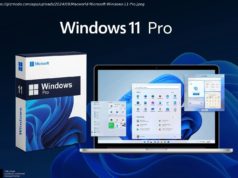Apple has announced its next-generation custom silicon for Macs.
Apple’s custom silicon has been rumored for years now, but now the Cupertino behemoth has finally given us some actual information about the Apple M1, the SoC behind the move to ARM. Just like many other ARM chips already on the market, the CPU is a 8-core chip with a BIG.little configuration, with four high-performance cores, and four power-efficient cores. Apple is also including an 8-core GPU in the SoC, which should be more powerful than the Intel Iris graphics found on lower-end MacBooks. Apple is making some pretty bold statements about its M1 chip, claiming that it offers up to 3.5x performance over « competing CPUs », though we’re not sure what level of performance Apple is aiming at here. Apple has also claimed that the Apple M1 is three times more powerful per watt than the « Latest PC laptop chip », which is also incredibly vague. What is impressive, however, is that Apple has apparently created its own Thunderbolt controller, which means that even though Apple is tossing out Intel for its entry-level computing products, those products will still have access to Thunderbolt. Luckily, because preorders for the new MacBook Air, MacBook Pro 13 and Mac mini are available today, it won’t be long until we can test Apple’s performance claims ourselves. The Apple M1 won’t be available on its own, so its availability is ultimately tied to the products it’s powering. At its One More Thing event on November 10, Apple announced that all three products powered by the M1 – the New MacBook Air, New MacBook Pro 13 and Mac mini – would all be available for preorder on the same day. We don’t know how long it’ll take for any of these products to ship after you’ve preordered, but you can assume that if you order one today, it’ll arrive within a week or so. Again, the Apple M1 isn’t sold on its own, which means that the price entirely depends on the device it’s being sold in. However, because the New MacBook Air and New MacBook Pro 13 haven’t moved in price, it doesn’t seem like the move to in-house silicon is going to save consumers any money.






